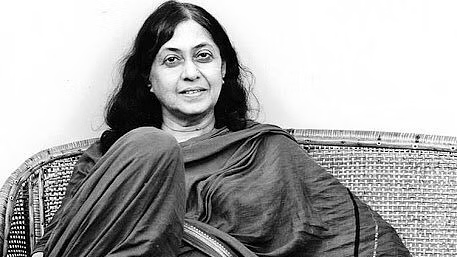
“…Dress in sarees, be girl
Be wife, they said. Be embroidered, be cook,
Be a quarreler with servants. Fit in. Oh,
Belong, cried the categorizers. Don‟t sit
On walls or peep in through our lace-draped windows.
Be Amy or be Kamala or better
Still, be Madhavikutty. It is time to
Choose a name, a role…”
So reads a section from Kamala Das‘s gender defying autobiographical poem titled “An Introduction”. Charecterisation of identity is a common closeting function adapted by the Indian society, so what sets apart Kamala Surayya, or more lovingly, Madhavikutty in her singular struggle against the system of oppression?
As a student, my first encounter with Das’s poetry was in college, through a course titled “Indian Writing in English”. Quite attuned to expecting a familiar note of post-partition blues, I was taken aback by the rich Malayali textuality and bursts of transgression that peeked between the lines of her poetry. Most poets writing in English in the twenty-first century, belonging from Third world countries, have often been accused of abandoning their culture and adopting the language of their oppressors. Yet, Das weaved a curious case of making the same English a means of her protest, it became as much hers as her native tongue of Malayali.
Early life and Major Works
Many authors do not usually have a huge repertoire to refer to for their initial beginnings. But that was not the case for Kamala Das. Coming from a family steeped in literature, she was immersed in a rich cultural environment. Born to V. M. Nair, a managing editor of the widely circulated Malayalam daily “Mathrubhumi“, and Nalapat Balamani Amma, a renowned Malayali poet, young Kamala was also influenced to pursue a career in writing under the wing of her great uncle, Nalapat Narayana Menon, who was both poet and a translator.

Though always in the eye of the public, it was with the publication of her book “My Story“(1976) that she came under scrutiny for being largely ‘obscene’. And it was the same confessional nature of her poems which led to her being considered at par with the likes of Anne Sexton, Robert Lowell and even Sylvia Plath. Other than her contribution to poetry, she was also a syndicated columnist who once claimed that “poetry does not sell in this country”. Her columns, ranging from various topics such as woman empowerment, child upliftment, and later, politics, were well recepted by the public.
“Poets, even the most insignificant of them, are different from other people. They cannot close their shops like shopmen and return home. Their shop is their mind and as long as they carry it with them, they feel the pressures and the torments. A poet’s raw material is not stone or clay; it is her personality. ” Taken from “My Story”, the following quote showcases her ability to eloquently put forward her viewpoint without dabbling in what the world had to say about her. Her unique flavour, distinct in incorporated elements from Malayalam language and culture, made it all the more a treat to read.
Autobiographical verse was by far, her largest area of engagement in terms of her writing. In 1987, she wrote Balyakala Smaranakal (Childhood memories) describing her residences in Nalappattu in Punnayurkulam and Landan Road in Kolkata. Offering an insight into people and experiences gathered along the way, the book is regarded as one of Madhavikutty’s three major novels and an exceptional piece in her mother tongue.
Legacy
As a Malayali woman, Kamala Das’s work was groundbreaking due to its candid exploration of female sexuality, desire, and identity. It is also important to put into context the patriarchal India around which she centered her writing. In 2009, The Times recognized her as “the mother of modern English Indian poetry”. There can be no better statement to justify her legacy as an author and more importantly, as a humanitarian.





